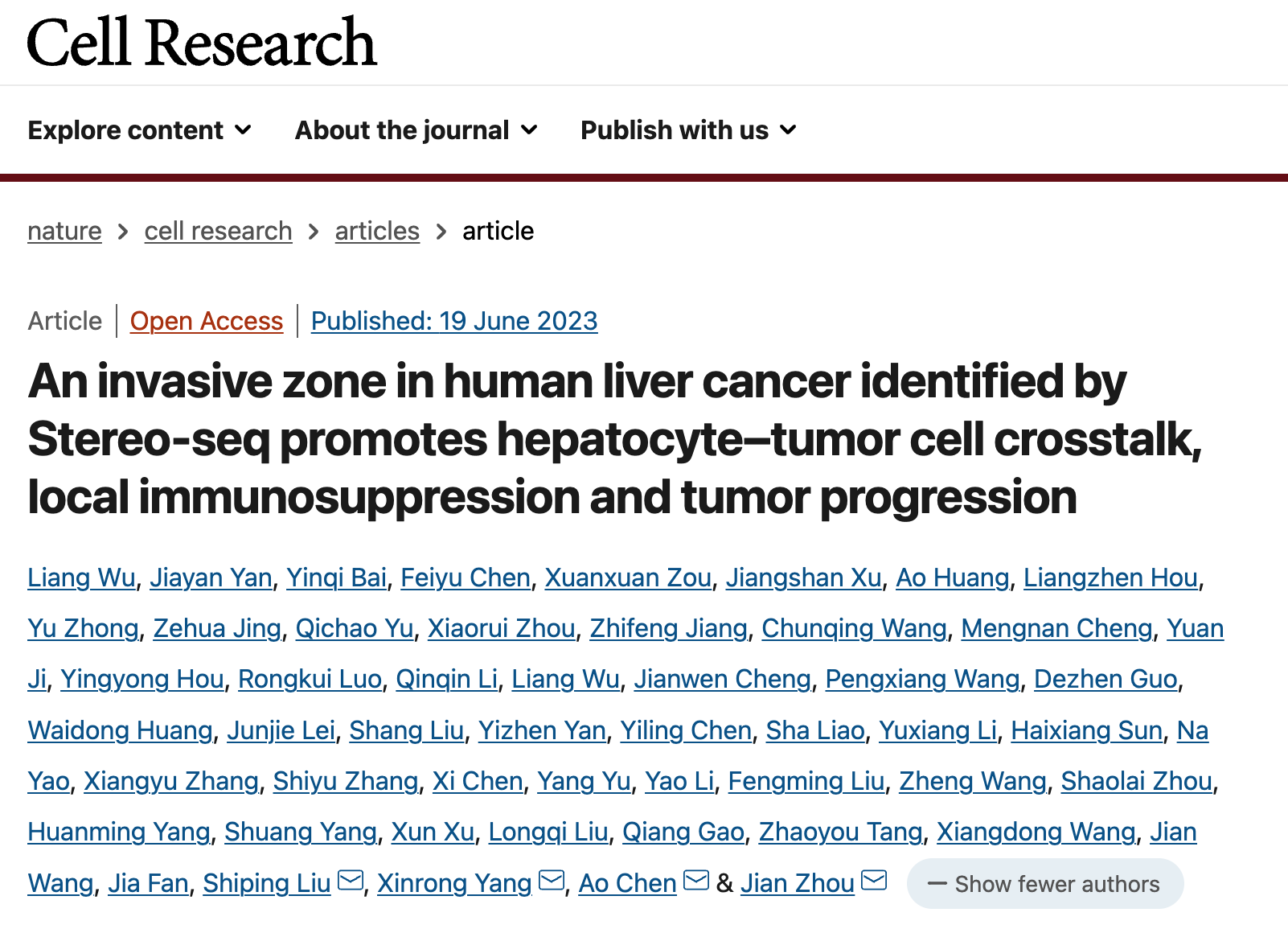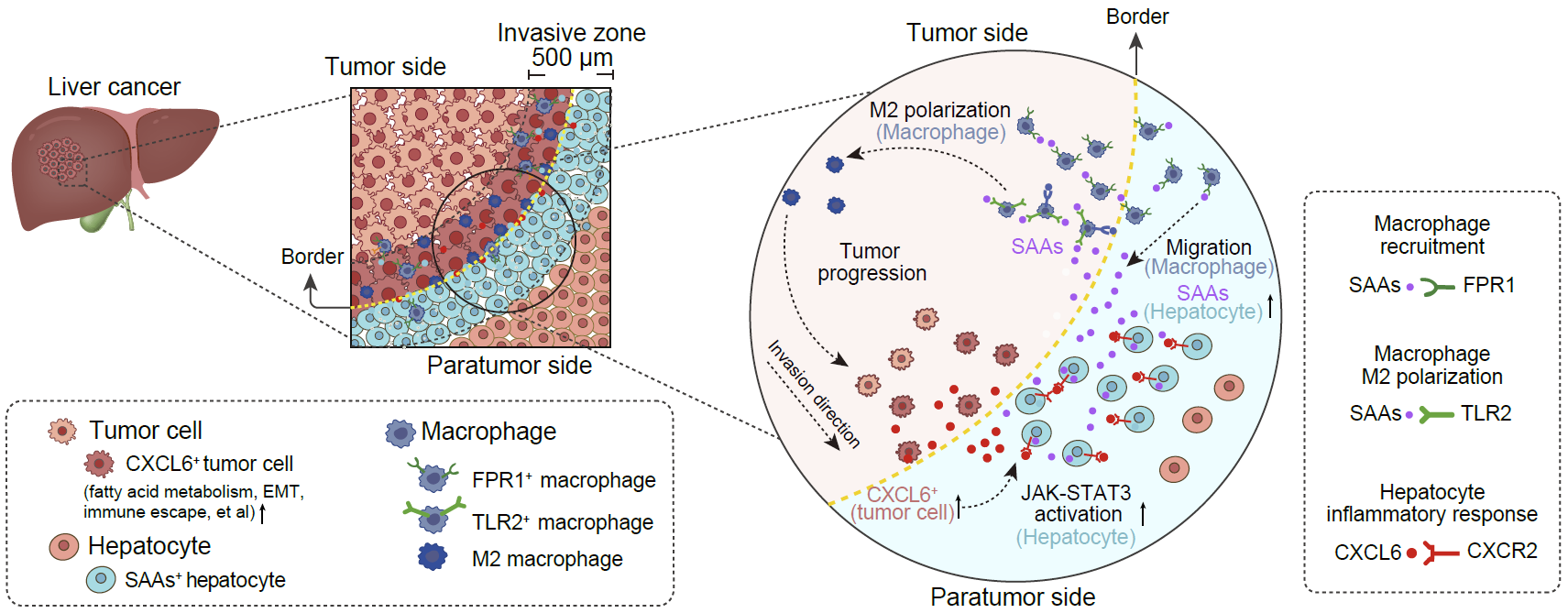June 22, Shenzhen - In a groundbreaking study conducted in collaboration with Fu Dan University, BGI-Research, and other institutes, researchers identified and characterized a novel invasive zone in liver cancer, shedding new light on tumor invasion and metastasis. By utilizing BGI Group's advanced spatial-temporal multi-omics technology, Stereo-seq, and single-cell technology, DNBelab C4, potential treatment strategies for advanced liver cancer and other solid tumors were uncovered. The study has recently been published in Cell Research.
 An invasive zone in human liver cancer identified by Stereo-seq promotes hepatocyte–tumor cell crosstalk, local immunosuppression and tumor progression is published in Cell Research.
An invasive zone in human liver cancer identified by Stereo-seq promotes hepatocyte–tumor cell crosstalk, local immunosuppression and tumor progression is published in Cell Research.
Liver cancer is the third leading cause of cancer-related deaths worldwide, with over 900,000 new cases and more than 800,000 fatalities reported in 2020. Despite extensive research, understanding the precise mechanisms by which cancer cells target and attack healthy liver cells has remained elusive.
The research team focused on studying the cellular composition, immune status, and characteristics of tumor cells in the border region of tumor invasion. They discovered that the area within 250 micrometers on both sides of the invasion border, encompassing the tumor and adjacent normal liver cells, exhibited the highest level of activity. This critical 500-micrometer region was designated as the "invasive zone," providing crucial insights into the invasive nature of liver cancer.
In this zone, the tumor cells make the normal hepatocytes (the main functional cells of the liver) behave differently. They release a substance called CXCL6, which triggers a JAK-STAT3 pathway in the nearby normal hepatocytes. This JAK-STAT3 signaling activation causes the normal hepatocytes to produce an excessive amount of a protein called Serum Amyloid A (SAA). This process is referred to as overexpression.
Furthermore, in the tumor invasion zone, the overexpression and release of SAAs from normal hepatocytes attract a type of immune cell called macrophages and causes them to change into M2-type macrophages. Macrophages are a type of white blood cell in the immune system responsible for surrounding and killing microorganisms, removing dead cells, and stimulating the activity of other immune system cells. However, M2-type macrophages have a suppressive effect on the immune system, creating an environment where immune activity is weakened.
 The mechanism of tumor cell invasion in an invasive zone.
The mechanism of tumor cell invasion in an invasive zone.
The researchers closely examined the relationship between liver cells with high levels of SAA expression in the invasive zone and tumor growth. They discovered a strong correlation between the presence of these liver cells and a poorer prognosis for individuals with primary or metastatic liver cancer. This raises the question: Can tumor cell progression and invasion be controlled by regulating SAA expression?
To further investigate this, scientists conducted experiments on mice with liver tumors by reducing the expression of SAAs in liver cells. The results showed a decrease in the accumulation of macrophages within the tumor's invasive zone, resulting in slower tumor growth. This finding suggests that controlling the expression of SAAs in normal hepatocytes could be a new and promising approach for treating liver cancer.
"By utilizing BGI's Stereo-seq and DNBelab C4 technology, the discovery of a new invasive zone in the tumor not only enhances our understanding of tumor dissemination but also opens up potential avenues for advancing treatments against advanced liver cancer and other solid tumors," said Dr. Wu Liang, a researcher at BGI-Research and co-first author of this study.
The project underwent ethical review and adheres to regulations, and privacy protocols.
Read the article: https://www.nature.com/articles/s41422-023-00831-1



